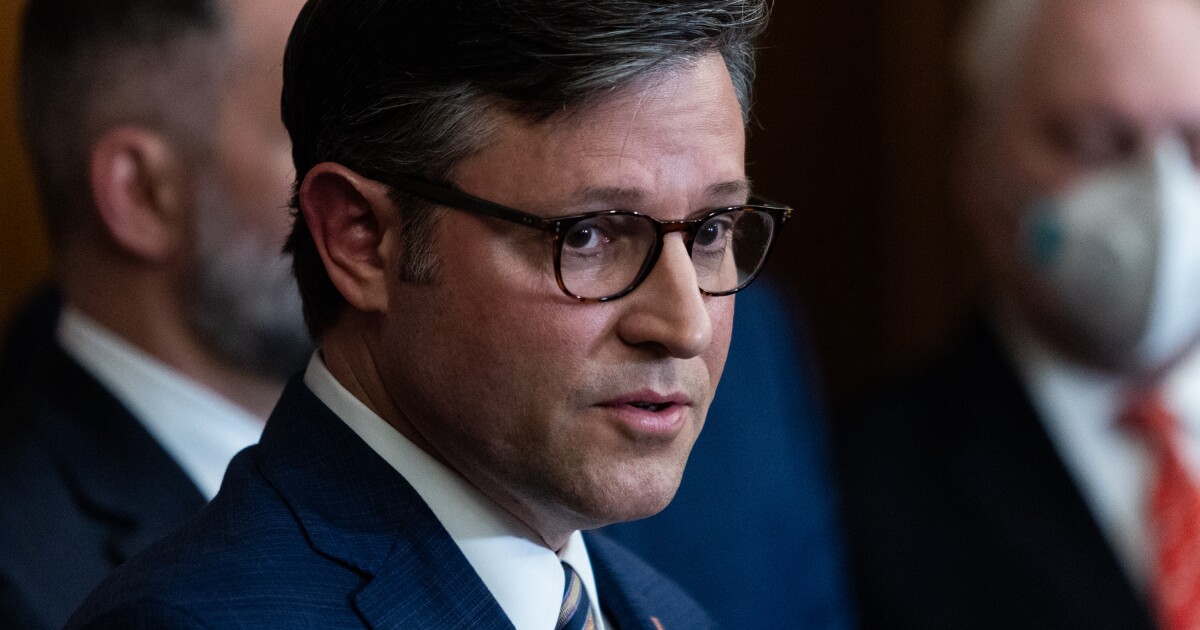

Speaker Mike Johnson (R-LA) is expected to decide Thursday what stop-gap funding measure he will put forward to avert a government shutdown on Nov. 17, his first real test since winning the gavel.
The newly elected House speaker is considering two options: a clean continuing resolution into January — meaning no policy riders attached to it, and the laddered continuing resolution that would extend some appropriations bills into January and the rest into February.
BIDEN CAMPAIGN TAKES VICTORY LAP ON DEMOCRATIC WINS AFTER POOR POLLING
Throughout the week, but especially on Wednesday, Johnson and House Majority Whip Tom Emmer (R-MN) have spent hours holding listening sessions behind closed doors with members of the conference as the speaker tries to come to a decision about what version of a continuing resolution he will advance, according to a source familiar with the meetings.
Members have expressed that expectations are high for Johnson at the moment, and everyone wants him to succeed. But at the moment, there is confusion about what exactly the continuing resolution will look like and whether the version he chooses can even pass the Senate and avoid a government shutdown.
“There’s a complete lack of clarity on what the approach is going to be. He hasn’t telegraphed it because I believe that he’s not made the decision, and it’s his first decision as speaker, effectively,” a senior GOP member told the Washington Examiner. “… With trillions of dollars of consequences, a significant amount of policy consequences, it defines whether you are an effective speaker or not.”
Regardless of what version he picks, it will face some form of opposition.
“I think that’s so overcomplicating it,” Rep. Brian Fitzpatrick (R-PA) said of the laddered continuing resolution. “Just pass a clean CR and get through the rest of the approps bills and not shut the government down. It’s the dumbest thing on the planet to shut the government down.”
A number of other Republican members share Fitzpatrick’s sentiment that the bifurcated continuing resolution is just overcomplicating matters. But ultimately, they will support whatever measure can garner the 218 votes necessary to pass.
However, even if it were to pass the House, the Senate is not fond of the idea, and it will likely face trouble getting out of the upper chamber.
“Unless you’re engaged in that conversation with the Senate in advance, I don’t know that it has a lot of likelihood of a passage,” said Rep. French Hill (R-AR). “But I’m for what 218 Republicans are for on a continuing resolution. But we need to do it sooner rather than later.”
When it comes to the clean, continuing resolution that has more solid and vocal opposition among Republicans, however, if Johnson were to put a clean stop-gap measure up, then it would likely win over Democrats in the House, making its passage more likely in both chambers.
However, hardline conservative members are staunchly opposed to the idea of another clean continuing resolution after the House passed one in September under former Speaker Kevin McCarthy (R-CA) to avoid a shutdown.
“I don’t think there’s the votes for a clean CR,” Rep. Byron Donalds (R-FL) said. “So I think it’s gonna be a laddered approach.”
Rep. Ralph Norman (R-SC) explicitly said he would vote against a clean continuing resolution, and House Freedom Caucus Chairman Scott Perry (R-PA) said his advice to Johnson would be “no clean CR.”
In addition to the fight over the continuing resolution, there is also a continued fight over appropriations bills, especially the Finacial Services and General Government appropriations bill and the Transportation, Housing and Urban Development appropriations bill.
The T-HUD bill has been punted and won’t be voted on this week as there was opposition on both sides of the Republican ideological spectrum. Centrist members were upset, in part, about cuts to Amtrak in the bill, and hardline conservative members wanted more cuts to the passenger railway.
On the financial services appropriation bill, the opposition is mostly on the more centrist side as a number of members are against provisions in the bill. Their most notable objection is that it includes a provision to rescind the District of Columbia’s Reproductive Health Non-Discrimination Act.
“I think that we need to be much more respectful of the difficult decision that women have to make. I think we need to respect the city’s determination, and I think it’s a provision that is unnecessary in the bill,” Rep. Marc Molinaro (R-NY) told reporters.
Fitzpatrick is also against the bill because of the DC provision that bans discrimination over employees’ reproductive decisions.
“That was the first thing I saw, and it put me in the no category right away,” he said.
Despite the vocal opposition and the likelihood of the bill failing, it is scheduled to be voted on Thursday.
CLICK HERE TO READ MORE FROM THE WASHINGTON EXAMINER
If the bill is brought up, there is a good chance this would mark the first real policy failure on the floor for House GOP Leadership under Johnson. A number of members believe that they shouldn’t bring the remaining appropriations to the floor before passing a continuing resolution, as each failed vote on the floor only weakens their hand in negotiations with the Senate.
“We’ll see if they want to keep going on with foolishness or not,” the senior GOP member said.





